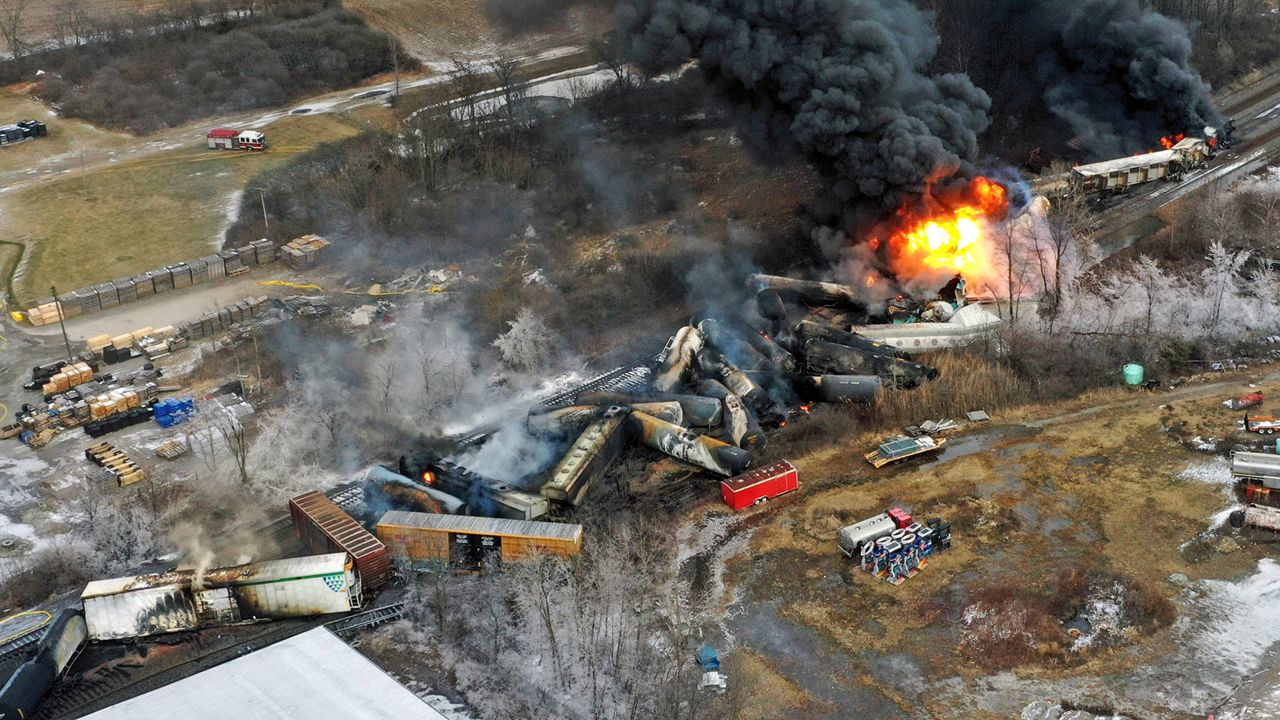Federal environmental authorities have ordered a temporary halt in the shipment of contaminated waste from the site of a fiery train derailment earlier this month in eastern Ohio near the Pennsylvania state line.
Region 5 administrator Debra Shore of the Environmental Protection Agency said Saturday the agency ordered Norfolk Southern to “pause” shipments from the site of the Feb. 3 derailment in East Palestine but vowed that removal of the material would resume “very soon.”
“Everyone wants this contamination gone from the community. They don’t want the worry, and they don’t want the smell, and we owe it to the people of East Palestine to move it out of the community as quickly as possible,” Shore said.
Until Friday, Shore said, the rail company had been solely responsible for the disposal of the waste and supplied Ohio environmental officials with a list of selected and utilized disposal sites. Going forward, disposal plans including locations and transportation routes for contaminated waste will be subject to EPA review and approval, she said.
“EPA will ensure that all waste is disposed of in a safe and lawful manner at EPA-certified facilities to prevent further release of hazardous substances and impacts to communities,” Shore said. She said officials had heard concerns from residents and others in a number of states and were reviewing “the transport of some of this waste over long distances and finding the appropriate permitted and certified sites to take the waste.”
The Ohio governor's office said Saturday night that of the twenty truckloads (approximately 280 tons) of hazardous solid waste hauled away, 15 truckloads of contaminated soil was disposed of at a Michigan hazardous waste treatment and disposal facility while five truckloads had been returned to East Palestine.
Liquid waste already trucked out of East Palestine would be disposed of at a licensed hazardous waste treatment and disposal facility in Texas, but that facility would not accept more liquid waste, the Ohio governor's office said.
“Currently, about 102,000 gallons of liquid waste and 4,500 cubic yards of solid waste remain in storage on site in East Palestine, not including the five truckloads returned to the village,” the governor's office said. “Additional solid and liquid wastes are being generated as the cleanup progresses.”
No one was injured when 38 Norfolk Southern cars derailed in a fiery, mangled mess on the outskirts of town, but as fears grew about a potential explosion due to hazardous chemicals in five of the rail cars, officials evacuated the area. They later opted to release and burn toxic vinyl chloride from the tanker cars, sending flames and black smoke billowing into the sky again.
Shore said the EPA was not involved in the decision to do the controlled burn, but she called it a “well-founded” decision by local and state officials based on the information they had at the time “to deal with a highly explosive toxic chemical.”
Federal and state officials have repeatedly said it’s safe for evacuated residents to return to the area and that air testing in the town and inside hundreds of homes hasn’t detected any concerning levels of contaminants from the fires or burned chemicals. The state says the local municipal drinking water system is safe, and bottled water is available while testing is conducted for those with private wells.
Despite those assurances and a bevy of news conferences and visits from politicians, many residents still express a sense of mistrust or have lingering questions about what they have been exposed to and how it will impact the future of their families and their communities.



